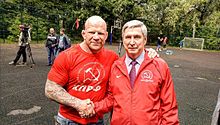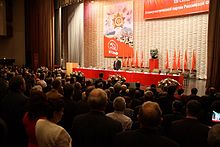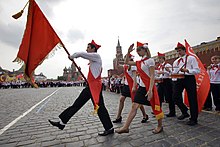Communist Party of the Russian Federation
This is the sighted version that was marked on June 17, 2021. There is 1 pending change that needs to be sighted.
The Communist Party of the Russian Federation (CPRF) (Russian Коммунистическая партия Российской Федерации (КПРФ) / transcription: Kommunistitscheskaja partija Rossiskoj Federazii (KPRF)) is a political party in Russia and with about 162.000 members, it is the communist party with the largest membership in Eastern Europe. Political goals of the CPRF include the re-nationalization of key industries and opposition to the privatization of land. The party combines socialist and nationalist ideals, but also some social democratic ones. It sees itself as the legal successor to the CPSU in Russia.
According to various assessments, the CPRF plays the role of a valve to the left within the Putin system, but without calling its power into question. It is a so-called spoiler party. In the Duma, it rarely votes against the ruling United Russia party in important votes and was therefore described by political scientist Jürgen Hartmann, as in 2012, as a junior partner of the state party. Others, however, such as Roman Goncharenko of Deutsche Welle, see the CPRF as "the only real opposition force in the Russian parliament". A similar opinion is held by the political scientist Luke March, who described the CPRF in an essay for the Federal Agency for Civic Education as "the only halfway independent opposition party in Russia". The relationship with the Kremlin was also an issue during the 2012 split: while the Russian Communists who split accused the CPRF of cooperating with the Kremlin, the CPRF, for its part, accused the splitters of being controlled by the Kremlin.
Program
Basic orientation
In the party's current programme, which was adopted in 2008, the CPRF describes itself as the only political organisation that consistently defends workers' rights and the interests of the nation state. It is a party of patriots and internationalists, a party of friendship between peoples and protection of Russian civilization. The CPRF defends communist ideals and protects the interests of the working class, the peasantry, the intelligentsia and all working people. The slogan of the Communist Party, which is also included in its emblem, is "Russia, Work, People's Rule, Socialism!". The anthem of the CPRF is the International.
Central political demands are:
- socio-political free medical care, recreation and education
- in terms of economic and financial policy, the abandonment of the uniform income tax rate of 13%, which favours the rich, and its replacement by a progressive tax system, as well as the socialisation of the means of production
- in terms of foreign policy, a strengthening of Russia's position in international politics.
Russia had returned to capitalism through deception and violence. This, however, was the path of social regression, leading to national catastrophe and the death of civilization. Since the introduction of capitalism in Russia, a "genocide of a great nation" has been taking place. This is taking place on both a cultural and a physical level, since the population, which is not needed for the creation of value, is worthless in capitalism. In this context, the CPRF stresses the importance of patriotism in the struggle against anti-communist forces and speaks of a "Russian question". The solution of this question would essentially coincide with the struggle for socialism.
The main long-term goal is the establishment of a renewed "socialism of the 21st century" in Russia. The program states that the party will be guided by the teachings of Marxism-Leninism. However, these would be constantly developed on the basis of new experiences and achievements in science and culture.
Economic policy
The CPRF believes that, despite temporary setbacks in the revolutionary movement, modernity represents the transition from capitalism to socialism. Capitalism, which today dominates most of the world, is a society in which material and spiritual production is subject to the market laws of profit maximization and capital accumulation. Everything becomes a commodity, money is the main measure of human relations. The capitalist mode of production means the unbridled exploitation of human beings and natural resources, without taking into account the destructive consequences for the lives of future generations and their environment.
Vladimir Lenin's doctrine of imperialism as the highest stage of capitalism was confirmed. The process of capital concentration had led to the formation of large monopolies at the beginning of the 20th century, and banking and industrial capital had become intermingled. The escalating struggle for the redistribution of markets had finally caused two world wars with enormous human victims and many other local conflicts.
The existing structure of the world allows the leading capitalist states to maintain relative stability, weaken workers' and other protest movements, and balance social conflicts in individual countries. However, by offering a high level of consumption to a small group of countries, capitalism simultaneously entangles humanity in new contradictions, greatly exacerbating all global problems.
According to its program, the Communist Party considers it necessary to reform the country in three steps.
In the first phase, it is planned to bring about the "rule of the working people" with the help of a coalition led by the CPRF. By achieving this goal, the aim is to eliminate the perceived disastrous consequences of the reforms carried out in recent decades. In particular, property privatized in the 1990s is to be re-nationalized. At the same time, small producers of goods are to remain in existence and be protected from the grip of big business, corrupt officials and organized crime. Russia's current administrative bodies are to be replaced by soviets.
In the second phase, it is planned to strengthen the role of soviets and trade unions. There will be a gradual transition to a socialist economy, while maintaining small private capital.
Finally, in the third phase, the construction of socialism is planned.
Foreign Policy
Another important place in the party's work is occupied by the proclaimed incompatibility of Russia with a "New World Order" under Western leadership. After the destruction of the Soviet Union and the restoration of capitalism in the post-Soviet space and Eastern Europe, the United States and its closest allies would pursue a policy of imperialist globalization. The struggle for control of the planet's natural resources was coming to a head. To achieve their goals, imperialist circles would actively resort to military operations. NATO is advancing towards the Russian borders. The Russian Federation was threatened with being transformed into a mere reserve of raw materials for the imperialist states. The Russian people, however, by virtue of their millennial history, their qualities of sobornost and striving for sovereignty, social sentiment, deep faith and indestructible altruism, would emphatically reject the "consumerist lures of the bourgeoisie" and the promises of a "liberal-democratic paradise".
Religion
According to party leader Zyuganov, the party respects the confessions of all peoples. However, it rejects the transformation of religion into an ideological tool. On the socio-political level, the CPRF also supports cooperation with the Russian Orthodox Church, which is praised for its commitment to the "weak, sick and suffering". In a condolence message on the death of Patriarch Alexius II in 2008, Gennady Zyuganov said, "We hope to continue comprehensive cooperation with the Russian Orthodox Church and the Orthodox world - because we ourselves are part of the Orthodox world, since about one-third of our voters and supporters are truly religious people." Thus, the CPRF also joined with the Orthodox Church in supporting the passage of a law "against the intrusion of foreign sects" into Russia. Zyuganov called "precisely the madness of fighting religion" "one of the reasons for the collapse of the USSR and all our present problems."
History
The CPRF acknowledges and condemns certain violations of "socialist legality" in the 1930s and 1940s. In Joseph Stalin's time, there were both unjustified repressions against innocent people and excessively severe punishments for those who actually committed crimes. On the Great Terror, Zyuganov noted in 2009, "As for repressions, the party declared their inadmissibility as early as the 1950s and vowed that they would never happen again." However, it is not Stalin who is named as the main culprit for the abuses of the time, but the two heads of the USSR Interior Ministry, Genrich Yagoda and Nikolai Yezhov. These would not have acted on Stalin's personal initiative and would have been sentenced to death in court for their excesses during his lifetime.
Also, under Josef Stalin there had not been millions of deaths of a "Stalinist totalitarianism", these figures were inventions of "liberal propagandists". In the 32 years between 1921 and 1953, 4 million people had been sent to prisons and camps for political crimes. Of these prisoners, about 800,000 were sentenced to death. In presenting these figures, the CPRF refers to the historian Viktor Semskov. In 1992, together with the historians Gábor T. Rittersporn and J. Arch Getty, he researched the number of Stalin's victims in the KGB archives, which had only just been opened, and published his findings together with his colleagues in 1993 under the title "Victims of the Soviet Prison System in the Pre-War Years: A First Approach Based on Archival Evidence" in the American Historical Review.
The CPRF calls for an assessment of Stalin's role to take into account the economic achievements under his leadership, the victory in the Great Patriotic War, the creation of an "atomic shield" and the reconstruction of the country after the war. Stalin images and busts are ubiquitous in party offices and election campaigns. Stalin, Zyuganov argues, led the Soviet Union into an era of unprecedented "prosperity and security." The extent to which there is actually a corresponding programme behind the apparent Stalinism, or whether it is more symbolic, is not clear. One main reason for the Stalin nostalgia is probably the large membership base of mostly older comrades from the era of the USSR, who were opposed to the developments, especially under Mikhail Gorbachev. Only slightly more than ten percent of the members are under forty years of age. In 1997, the number of members was 559,000; in 2016, due to the age-related decline in membership, it was only 162,000.
Inner structure
Organisational structure
The CPRF is represented in Russia by more than 14,000 local organizations in all 85 subjects of the Federation.
The supreme organ of the Communist Party is the Party Congress. Between congresses, the Central Committee, whose members are elected by the Party Congress, is the supreme organ. The Central Committee draws up documents on the most important Party questions on the basis of the programme and decisions of the Congresses. The executive organs of the Central Committee, which are elected by the same, are the Presidium and the Secretariat. The Presidium is to discuss political and organizational questions among the members of the Central Committee. The Secretariat shall serve to organize the day-to-day Party work and supervise the implementation of the decisions of the Party organs. The Secretariat shall report to the Presidium.
The average age of members in 2016 was 55.6 years, according to its own data. Many members still come from the stock of the CPSU.
Party-affiliated organizations
The youth organization of the CPRF is the Leninist Communist Youth League of the Russian Federation, which was founded in 1999 and is close to the CPRF. Like the youth organization of the CPSU, it is abbreviated to Komsomol. Membership in the organization is open to citizens of Russia from 14 to 35 years of age. The Komsomol of the Russian Federation is a member of the World Federation of Democratic Youth and in this role regularly participates in the World Youth and Student Festivals. The federation supports the creative competition "Land of Talents" for children and youth. It also organises the "Banner of Our Victory", a "patriotic education project" which aims to "encourage the younger generation to study the history of their country".
A pioneer organization for children is incorporated into the Komsomol of the Russian Federation. This organizes the annual "Pioneers' Day" in front of the Lenin Mausoleum in Moscow on May 19, the founding day of the Pioneers' Organization Vladimir Ilyich Lenin.
The KPRF in sports
Ivan Melnikov, who later became vice-chairman of the CPRF, founded a sports club affiliated with the party, the "Sports Club of the CPRF" (SK KPRF), in 2003. The occasion was the Russian Party of Life's proposal to hold a futsal tournament in 2003 at the Moscow State Institute of International Relations between representatives of its own party, the KPRF, the Union of Right Forces, Some Russia, Yabloko, and LDPR. This tournament was won by the KPRF team in a penalty shootout against the organizer, the Party of Life. Today the sports club of the KPRF includes the futsal club "MFK KPRF", the children's football academy "Junior KPRF", the children's figure skating school "Iskra KPRF", as well as sports teams in swimming, badminton, volleyball, basketball, ice hockey, boxing, judo and powerlifting. MFK KPRF achieved particular success, which in 2011 was promoted to the Russian Futsal Super League, the highest Russian futsal league. There, the club was runner-up in the 2018/19 season and even won the championship in the 2019/20 season. MFK KPRF achieved its first success at the international level in the 2019/20 UEFA Futsal Champions League, where it finished third. In August 2020, KPRF athlete Denis Ogloblin became the runner-up in the WRPF European Powerlifting Championship in the Amateur Masters 50-59 category. The powerlifter dedicated the success to the 75th anniversary of the Soviet victory in the Great Patriotic War. The CPRF sports club has some prominent members, such as former figure skater Oleg Ovsyannikov and strength athlete Maryana Naumova.

Martial artist Jeff Monson at a KPRF sporting event (July 14, 2016). .

XIII Congress of the CPRF (29 November 2008)

Pioneers in front of the Lenin Mausoleum (May 16, 2010)
Search within the encyclopedia